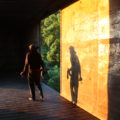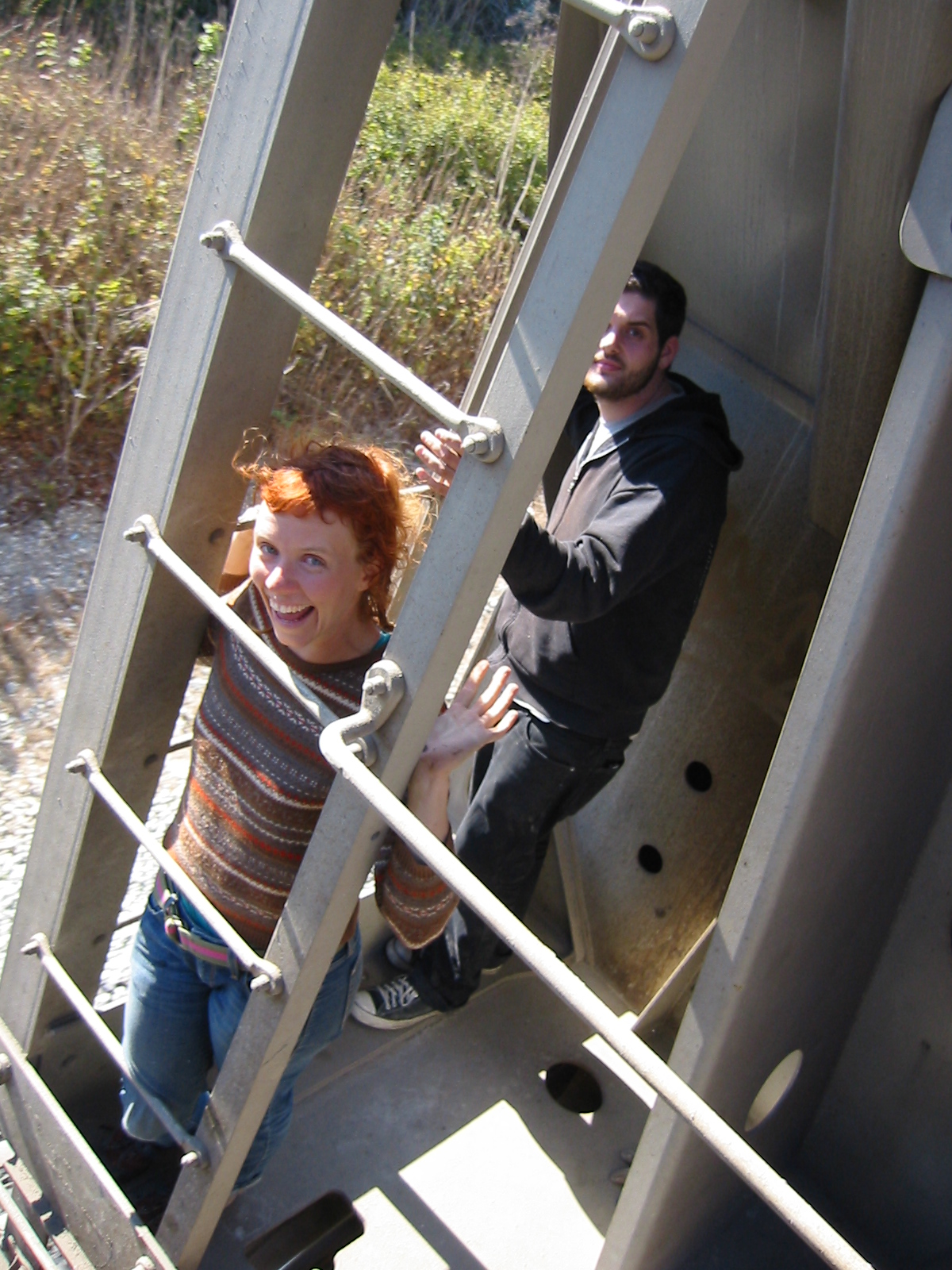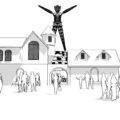a hobbyist’s guide to hopping freight

We’re on a northbound Southern Pacific freight. This is Philip and Michele’s first ride and my sixth. It still has the initial thrill. I cannot believe myself, what I am capable of. I am watching the world go by from the comfort of our open boxcar. I am on top of the world, all-powerful, omnipotent, sly and slippery as a snake. I’ve done it. The words, “Did it did it did it,” keep bouncing around in my head.
Philip is thin with powerful legs and arms. He wears tiny, studious, gold-rimmed glasses. He’s quiet, but keeps me laughing with his impersonations, sound effects, and silliness. Philip is a graphic designer for a publication in San Francisco.
Michele has curly, dark hair around her full face. She has dark gypsy eyes, wild and restless. She is adventurous and assertive and unafraid to ask the yard crews for information. She says, “Just doing something most women don’t do is really exciting for me. But it’s also a little sad we don’t hear more about women having adventures.”
We’re drinking good whiskey, passing around a cigar, probably fifteen minutes out of Sacramento. The fireball sun sinks into the golden fields as the train reaches open country and picks up speed. We’re passing miles and miles of junkyards along the northern edge of town. Philip and I are playing harmonica at one end of the boxcar, playing and singing Me and Bobby McGee. Michele says, “I can barely hear it over the sound of the train, but every once in a while, the harmonica wafts up. It gives me a feeling of peace and camaraderie.”
I am getting sleepy and pleasantly bored as the light slowly fades in the west. I lie down within sight of the open door. The moon reflects up from still ponds. The world is suffused with a silvery glow.
Image: train1.jpg
Caption: Watching the world go by from our open boxcar.
Outside everything is stillness. But inside our boxcar, it is steady pandemonium. The car makes a constant cacophony at high speeds. There is the steady, rhythmic thunk-thunk-thunk of the wheels on the rail, the knock-knock of the door latches and fasteners, the squawking as the brakes are applied to the wheels, the bump of the couplers as the train changes speed, the swinging and clanking of all the connectors and pneumatic lines, and the scratchy rattle that sounds impossibly like mice in the steel walls. We literally cannot hear ourselves speak in this boxcar. The steady rhythm of this percussion orchestra is punctuated by the other-worldly screaming of passing trains. They sound like demons torn away by the wind as they try to enter our new traveling home. This freight is hauling ass.
Freight-hopping. “It’s a kick in the ass. It’s a lot of fun,” said Duffy Littlejohn. “It is one of the last red-blooded American adventures left.” And he should know; he wrote the book on it, Hopping Freight Trains in America (Sand River Press, 1993), the definitive freight-hopper’s how-to manual.
Image: duffy.jpg
*Caption: Duffy Littlejohn, author of Hopping Freight Trains in America.
“I do it because it’s just fun. It’s really adventure. It’s not the kind of adventure that involves bungee cords, velodrome walls, and hang gliders. You don’t have to buy a lot of stuff and throw out a lot of money to do it. You can do it whenever you want, pretty much wherever you are in the country.
“All these other sports have all this pricey stuff that makes them exclusive and elite. That’s what I like about freight-hopping. It’s the opposite of elite. I’ve always hated elitism. Country club Republican shit.
“There’s the new and growing phenomenon of yuppie hobos. Recreational freight train riders. I’m one.” Littlejohn is a full-time lawyer and has ridden over 350,000 miles on freights in the U.S. and Canada. “You don’t have to be yuppie. You don’t necessarily have to be young or urban or professional. But that seems to be the people who are attracted to this.
“I think boredom has a lot to do with it. I feel it all the time. Like on the way over here, you see a train and your heart just goes into your mouth. You kinda just go, ‘God, I wish I could park my car and get the fuck out of here.’
“So who rides freight trains? Doctors, lawyers, Indian Chiefs, bored computer programmers, college professors, business executives, professional people and even working mothers. Anyone who likes to fuck off in a way that’s marginally illegal and a lot of fun.”
It was after midnight in the Oakland yard, and we finally had a lead on a train. A yardman said to check out the train on track fifty, so we were rolling the train, looking for a rideable car. It was very dark between strings of cars. We nearly stumbled over two yard workers taking a break between cars. They were smoking cigarettes and kicking back.
“Not much rideable on this train,” the man says out of the darkness. “You could ride these piggybacks, between the tires maybe, but it’d be a cold ride. This one’s okay.” He slaps the one he’s leaning against. I can barely make out that he’s a tall white guy with dark features. The other guy, a big dark black man, asks where we’re going. I can see his eyes and his teeth.
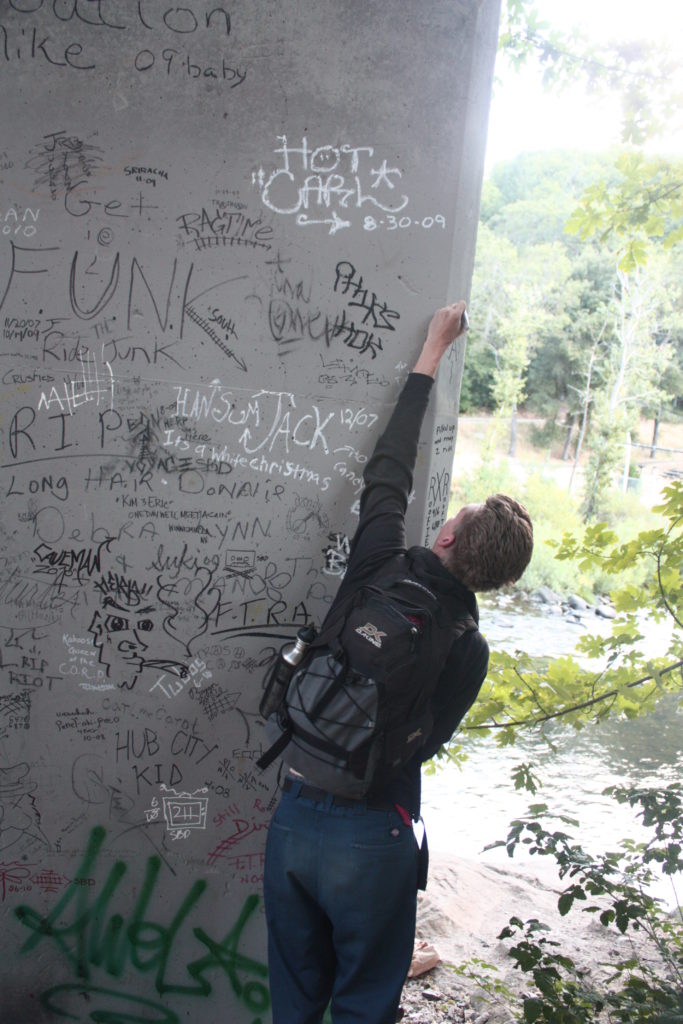
“North,” Philip says. Philip is convinced these guys are going to have us thrown in the hootch. Neither he nor Michele can believe how cool the rail workers are. These guys have thankless jobs, and the company doesn’t give a shit about them. They see us having a little adventure and getting something from their employer for nothing. They like it when we ride their trains.
The white guy offers to call in for information.
“Man, Joe’s gonna dog you,” the black guy says. Then to us: “Joe’s the P.O., the bull. He listens in on the same channel.”
“Glass Tower, this here’s Bill. Um, I’m just curious. We got anything going north?” the white guy asks his radio. “Just wondering.”
A woman’s voice comes back: “We got something going to Oregon on track five-oh. That’s a rollover. Train’s split on five-oh, six-three, and six-four.”
“You better get going before they start asking questions,” Bill says.
A man’s voice squawks over the radio, “Bill!”
“Uh-oh. That’s the Man,” the black guy says.
“You got someone following you there?” the railroad cop radios.
“Uh,” Bill delays, “Yeah, but I got rid of ’em. You know me, Joe. I can take care of things out here.” Bill breaks a big smile.
The cop clearly doesn’t believe Bill at all.
“Now you really better get movin’,” the black guy says, “But be careful.”
And we scramble away into the darkness, alert and paranoid, jumping at every sound, expecting the bull to appear out of thin air and arrest us. But the only thing we see of the bull is an occasional glimpse of his white pickup truck cruising the access roads, sweeping its headlights over the long strings of cars.
Michele is surprised how much walking and climbing over freight cars we do. “I’m dead tired on my feet,” Michele says, “and aching all over, but I’m doing it. This requires endurance I didn’t know I had.” In between the walking, we wait.
We adopt hobo names. Michele becomes Airbrake Annie. Philip becomes Four-Eyes, and says he’ll sign his name with four i’s. I become Dakota Modes.
We find our train and walk the length of it, looking for a rideable car. Our preference is an open boxcar and we luck out. We round up some dunnage bags, the inflatable bags used to cushion breakable freight. We keep ourselves off the cold metal floor, comfortably curled up in the deflated bags.
We stay up through the small hours of the morning, waiting for our train to be hooked up and get under way. By dawn, we are exhausted and can no longer stay awake. As we sleep, we are vaguely aware of something happening with our train.
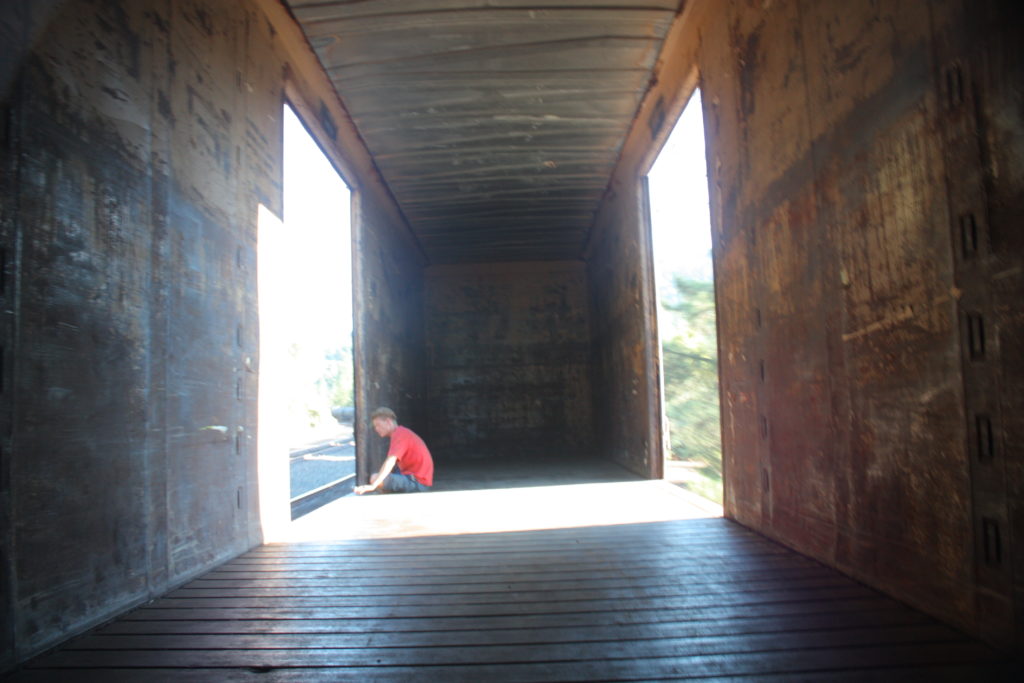
We wake up to a cool breeze and fresh air. We are rolling, cruising fast along the Sacramento Delta. We watch the old abandoned waterfront buildings and broken, rusted pilings float by us. The sun is bright, the sky blue. The rays glint off the delta.
Michele says, “With the wind blowing through my hair, I feel joy, a kind of freedom. I feel like the adventurer. I can do anything.” Philip nods. I am watching the sunshine play on the water. I am high just to be moving.
Original version published in the October 1994 issue of Might

